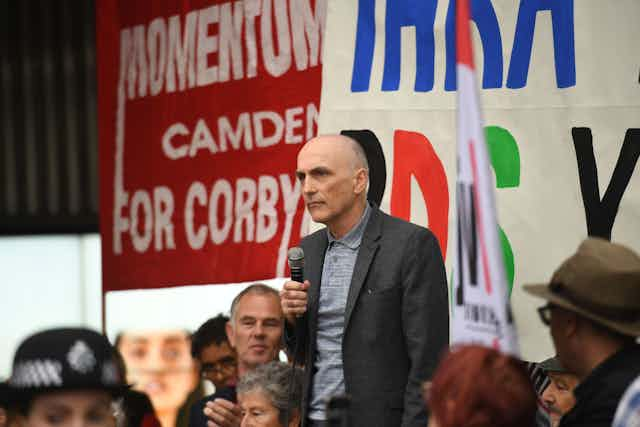The decision to readmit Chris Williamson, MP for Derby North, into the Labour Party was met with understandable scorn - including by the 116 parliamentarians who successfully protested it. Although the move was overturned days later, when Williamson was once again suspended, it is impossible not to see in it an example of the type of Machiavellian electoral pragmatism that the Corbyn leadership used to deride when it came to New Labour.
Indeed, Williamson’s suspension in February for saying the party had been “too apologetic” over accusations of anti-Semitism was largely driven by the perceived electoral threat of the Independent Group. After all, at least one of the MPs who quit Labour to join the new group explicitly cited antisemitism as the motivation for her departure.
And, recently, Williamson’s brief re-entry into the Labour ranks was seemingly motivated by the expectation that a snap election is imminent, and the need to defend his seat. This is very cynical stuff.
In its twists and turns, the Williamson affair has shown Labour at it worst. Sensible voices have, of course, condemned it. Admirable MPs like Jess Phillips proclaim themselves “disgusted but not surprised anymore” with attitudes within the party. Meanwhile, MPs like Ellie Reeves find themselves harangued by activists for protesting against Williamson’s place in the parliamentary party.
Antisemitism has clearly been tolerated to a degree that pre-2015 leaders would never have countenanced. One of the successes of New Labour, my forthcoming book March of the Moderates shows, was in coming down hard on such bile. But the strain was always there on the Labour hard left – ready to reemerge under a different leadership. Williamson forms the tip of a very deep iceberg.
A long history
In 1973, Harold Wilson sacked the actor-turned-Labour MP Andrew Faulds as a frontbench spokesman for the arts after accusing “Zionists in the Labour Party” of having double loyalties. Faulds held some “moderate” views in other areas of policy. But the fact that he continued to peddle the idea that the Jews exercised some malign and conspiratorial influence marks him as of a piece with the hard left.

In 1980, Faulds would go on to declare that “it is all too obvious now that when [President Carter] declared that ‘we can never be indifferent to the fate of freedom elsewhere’, he would make an exception when ‘elsewhere’ was Palestine and when we’re after the Jewish vote”. This shift from understandable sympathy for the Palestinian cause to overt antisemitism was a regular modus operandi for Labour MPs of this type.
Through the 1980s, maybe unsurprisingly, Ken Livingstone would become the standard bearer of this position. In 1986, Livingstone declared that the British Board of Deputies of British Jews had “been taken over by Jews who hold extreme right-wing views” and that, under the controversial Israeli prime minister Menachem Begin, “suddenly the Jews became reactionaries, [and] turned right to be nearly fascists”. Whatever the controversies in the Middle East, nuance was in short supply in the UK.

Save Livingstone’s 2000 London mayoralty win as an independent, Tony Blair and New Labour managed to move such types to the periphery of British politics. Even so, full renewal of the Labour Party was a long-term project, and one not quite achieved.
When Blair wrestled with the decisions over military interventions in Yugoslavia and Iraq, he still received the type of advice sent to him by the MP Tam Dalyell in February 1998. Dalyell was a prominent figure of the left who Jeremy Corbyn saw as “a titan of parliamentary scrutiny, fearless in pursuit of truth”.
As Dalyell told Blair in a private letter (held at the Churchill Archives Centre, Cambridge), “given the gravity of what [US Secretary of State Madeleine] Albright and [Secretary of Defense] William Cohen might contribute to, in the way of destruction, it is fair comment that they are Jewish and perceived… by many in our country, not only of the ethnic community, to have their own agenda”. Things had come full circle back to the comments made by Faulds in the early 1970s.
The point, then, is that there was a pattern here. These slightly nutty figures all knew each other. They attended the same meetings, they signed the same petitions, and they pickled the same dogma that infects the hard left today. The path from Dalyell to Livingstone to Corbyn is depressingly easy to plot.
Our traditional interpretation of “hard left” and “moderate” Labour politicians has tended to think about economics only – whether someone is for or against nationalisation, tax rises, regulation on business, and so forth. But, as Williamson shows, the dichotomy runs on both economic and religious tracks. An unthinking anti-Israeli and, often, anti-Jewish sentiment has marked Labour’s hard left. And this collective world view explains the current leadership’s attitude to the Williamson affair. To them, his only error was tone and emphasis, rather than the actual content.

